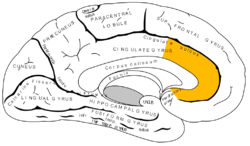Anterior cingulate gyrus
| Anterior cingulate cortex | |
|---|---|

Medial surface of left cerebral hemisphere, with anterior cingulate highlighted
|
|

Medial surface of right hemisphere, with Brodmann's areas numbered
|
|
| Details | |
| Identifiers | |
| Latin | Cortex cingularis anterior |
| NeuroNames | hier-143 |
| NeuroLex ID | Anterior cingulate cortex |
|
Anatomical terms of neuroanatomy
[]
|
|
The anterior cingulate cortex (ACC) is the frontal part of the cingulate cortex that resembles a "collar" surrounding the frontal part of the corpus callosum. It consists of Brodmann areas 24, 32, and 33.
It appears to play a role in a wide variety of autonomic functions, such as regulating blood pressure and heart rate.
It is also involved in certain higher-level functions, such as reward anticipation, decision-making, impulse control, and emotion.
The anterior cingulate cortex can be divided anatomically based on cognitive (dorsal), and emotional (ventral) components. The dorsal part of the ACC is connected with the prefrontal cortex and parietal cortex, as well as the motor system and the frontal eye fields, making it a central station for processing top-down and bottom-up stimuli and assigning appropriate control to other areas in the brain. By contrast, the ventral part of the ACC is connected with the amygdala, nucleus accumbens, hypothalamus, and anterior insula, and is involved in assessing the salience of emotion and motivational information. The ACC seems to be especially involved when effort is needed to carry out a task, such as in early learning and problem-solving.
...
Wikipedia
